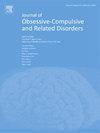荷兰儿童强迫症患者的家庭适应量表-焦虑(父母和孩子报告)和强迫破坏行为量表的验证
IF 1.5
4区 医学
Q3 PSYCHIATRY
Journal of Obsessive-Compulsive and Related Disorders
Pub Date : 2025-04-01
DOI:10.1016/j.jocrd.2025.100954
引用次数: 0
摘要
家庭适应(FA)和强迫破坏行为是影响儿童强迫症(OCD)发展、严重程度和治疗结果的关键因素。迫切需要评估FA和强迫破坏行为程度的有效问卷,以改善儿童强迫症的治疗效果。目的验证家庭适应焦虑量表(FASA家长报告)、FASA儿童报告(FASA- cr)和儿童强迫症强迫破坏行为量表(CD-POC,家长报告)在荷兰儿童强迫症人群中的应用。方法对8 ~ 18岁的临床组及临床组(90例)与对照组(90例)的联合样本FASA和FASA- cr前9项进行验证性因子分析(CFA)。考察了FASA、FASA- cr和CD-POC的内部一致性、收敛效度和标准效度。结果scfa支持原FASA(-CR)的双因子结构,拟合良好。FASA(-CR)的内部一致性范围为0.88 ~ 0.95。家长报告的FA与儿童报告的FA与强迫破坏行为呈正相关。父母和儿童报告FA均与强迫症症状筛查、强迫症严重程度和育儿压力呈正相关。CD-POC的内部一致性范围为0.91 ~ 0.94。FASA和CD-POC在区分强迫症儿童和非强迫症儿童方面表现出优异的效度,而FASA- cr则表现出可观的效度。结论荷兰FASA量表、FASA- cr量表和CD-POC量表的信效度较高。这些发现和FA和强迫破坏行为的工具增强了目前儿科强迫症的评估。针对这些共同的潜在因素,可以在临床实践中提高对儿童强迫症的认识、治疗计划、治疗监测和治疗效果。本文章由计算机程序翻译,如有差异,请以英文原文为准。
Validation of the Family Accommodation Scale – Anxiety (parent- and child-report) and Coercive Disruptive Behavior Scale for Pediatric OCD in Dutch pediatric OCD patients
Introduction
Family accommodation (FA) and coercive-disruptive behaviors are critical factors in the development, severity and treatment outcome of pediatric obsessive-compulsive disorder (OCD). Validated questionnaires assessing the degree of FA and coercive-disruptive behaviors are urgently needed to improve treatment outcomes for pediatric OCD.
Aims
To validate the Family Accommodation Scale – Anxiety (FASA parent-report), FASA child-report (FASA-CR) and Coercive Disruptive Behavior Scale for Pediatric OCD (CD-POC, parent-report) in a Dutch pediatric OCD population.
Methods
A confirmatory factor analysis (CFA) was performed on the first 9 items of the FASA and FASA-CR on both the clinical group and combined sample of clinical (N = 90) and control participants (N = 90), aged 8 to 18. Internal consistency, convergent validity and criterion validity of the FASA, FASA-CR and CD-POC were investigated.
Results
CFA supported the two-factor structure of the original FASA(-CR), indicating good fit. FASA(-CR)'s internal consistency ranged from .88 to .95. Positive correlations were found between parent-reported FA, child-reported FA and coercive-disruptive behaviors. Both parent- and child-report FA were positively correlated with OCD-symptom screening, OCD-severity and parenting stress. CD-POC's internal consistency ranged from .91 to .94. The FASA and CD-POC showed excellent- and the FASA-CR considerable criterion validity in distinguishing children with OCD from those without.
Conclusion
Findings support the reliability and validity of the Dutch FASA, FASA-CR and CD-POC. These findings and instruments of FA and coercive-disruptive behavior enhance the current assessment of pediatric OCD. Targeting these common underlying factors can improve understanding, treatment planning, treatment monitoring and treatment efficacy of pediatric OCD in clinical practice.
求助全文
通过发布文献求助,成功后即可免费获取论文全文。
去求助
来源期刊
CiteScore
4.00
自引率
5.60%
发文量
46
审稿时长
47 days
期刊介绍:
Journal of Obsessive-Compulsive and Related Disorders (JOCRD) is an international journal that publishes high quality research and clinically-oriented articles dealing with all aspects of obsessive-compulsive disorder (OCD) and related conditions (OC spectrum disorders; e.g., trichotillomania, hoarding, body dysmorphic disorder). The journal invites studies of clinical and non-clinical (i.e., student) samples of all age groups from the fields of psychiatry, psychology, neuroscience, and other medical and health sciences. The journal''s broad focus encompasses classification, assessment, psychological and psychiatric treatment, prevention, psychopathology, neurobiology and genetics. Clinical reports (descriptions of innovative treatment methods) and book reviews on all aspects of OCD-related disorders will be considered, as will theoretical and review articles that make valuable contributions.
Suitable topics for manuscripts include:
-The boundaries of OCD and relationships with OC spectrum disorders
-Validation of assessments of obsessive-compulsive and related phenomena
-OCD symptoms in diverse social and cultural contexts
-Studies of neurobiological and genetic factors in OCD and related conditions
-Experimental and descriptive psychopathology and epidemiological studies
-Studies on relationships among cognitive and behavioral variables in OCD and related disorders
-Interpersonal aspects of OCD and related disorders
-Evaluation of psychological and psychiatric treatment and prevention programs, and predictors of outcome.

 求助内容:
求助内容: 应助结果提醒方式:
应助结果提醒方式:


